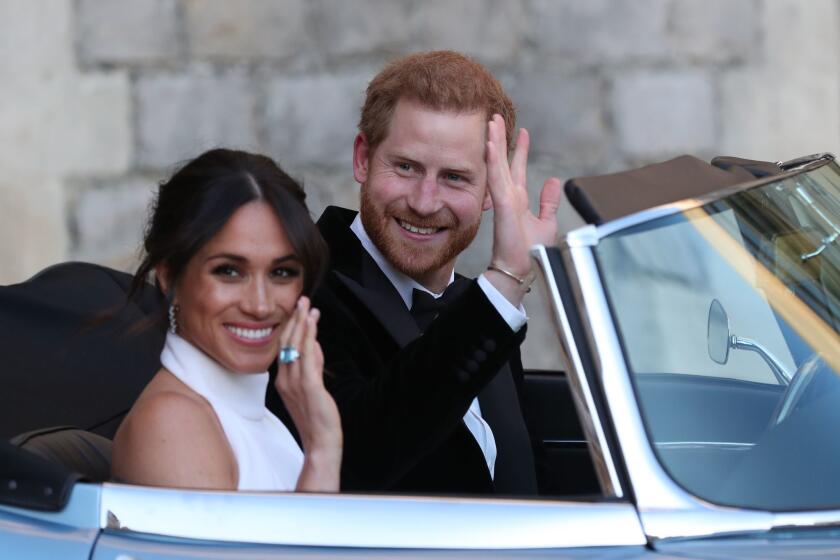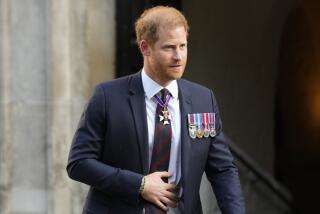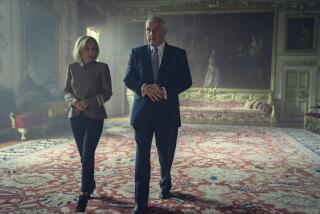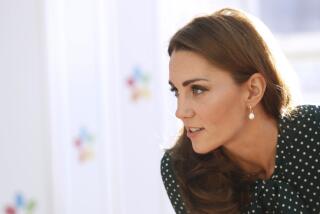A ‘hand grenade’: Harry and Meghan’s incendiary interview draws praise, fury in Britain
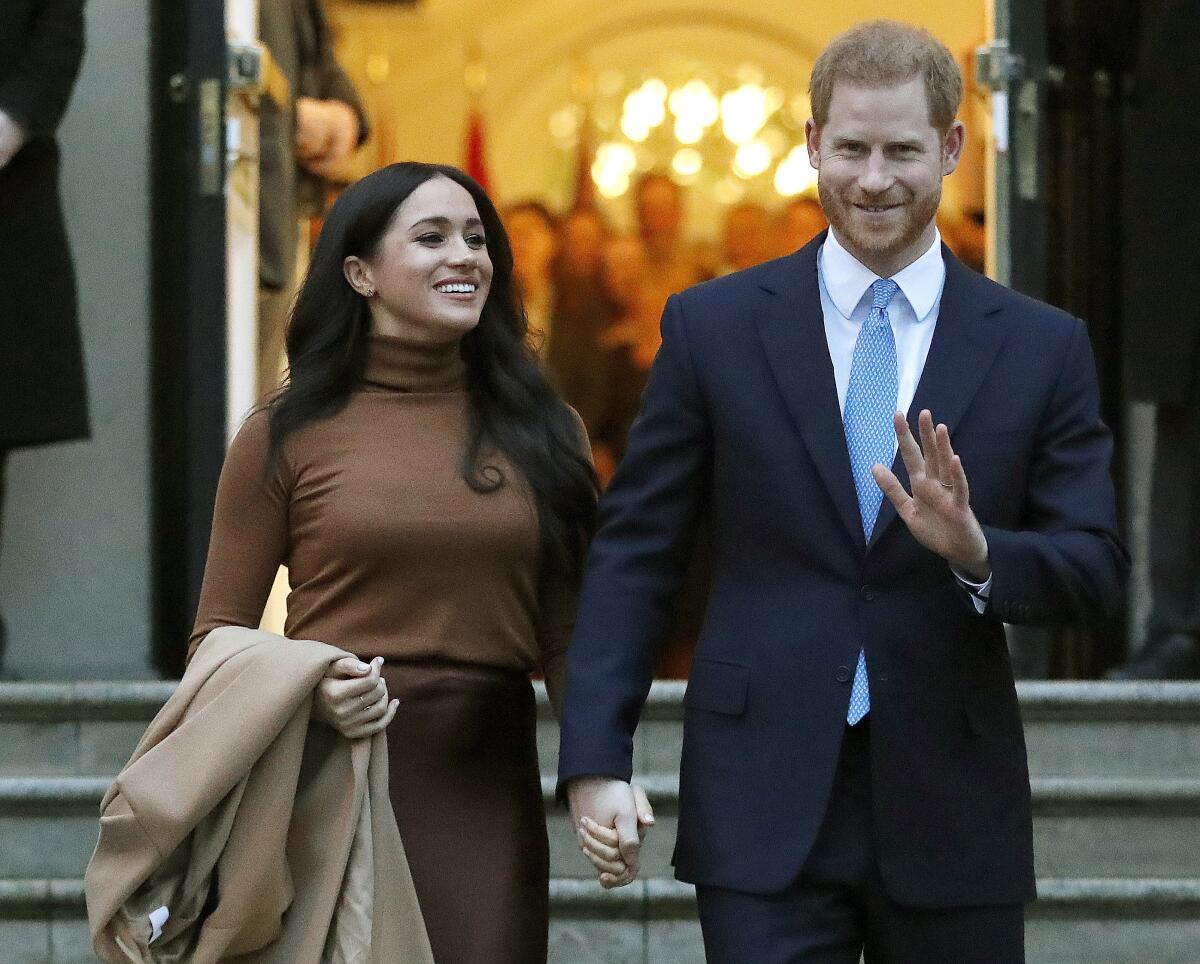
LONDON — Stiff upper lips? Hardly. Across Britain, that interview had everyone talking.
The country awoke Monday to word of Oprah Winfrey’s sensation-causing sit-down encounter, aired Sunday night in the U.S., with Prince Harry and the former Meghan Markle, the biracial American actress he married in 2018 in a fairytale-like ceremony watched the world over.
It was the first time the two had spoken publicly at length since “stepping back” from their royal roles last year, embarking on an odyssey that eventually landed them in Montecito, where they are neighbors of Winfrey. Their sometimes-harrowing depiction of their outwardly glittering former lives — privately confronting corrosive racism and a cold and unfeeling palace culture — lit up social media, generated blaring tabloid headlines and yielded contentious exchanges on British chat shows.
By the time the full interview with the couple, the Duke and Duchess of Sussex, aired on British television Monday evening, almost everyone had already formed an opinion, with reactions ranging from warm sympathy to spitting vitriol.
“It was a very soft-serving, soapy interview in Meghan’s favor,” royal biographer Anna Pasternak told the BBC. “None of Meghan’s real behavior was questioned. It was an absolute exercise in torching the house of Windsor.”
Some commentators, though, saw a vital and long-overdue airing of attitudes toward nonwhite Britons, both inside and outside royal circles. Los Angeles-born Meghan has a white father and a Black mother.
“Racism is normalized,” activist Shola Mos-Shogbamimu told the BBC after the first interview clips raced around the internet. She said many people “want to deny that the royal family as an institution is rooted in colonialism, racism and white supremacy.”
Coming on the heels of national hand-wringing over whether the popular Netflix series “The Crown” had unfairly tarnished the monarchy’s image, the interview landed like a “hand grenade,” said British-born Tina Brown, a longtime magazine editor and royal watcher.
Meghan and Harry spoke about a family member’s fears that their son might be ‘too brown.’ On Monday, Oprah revealed who they weren’t talking about.
“It almost sounded like the Saudi royal family, quite honestly,” Brown said Monday on CBS, referring to revelations such as Meghan disclosing that she was prevented from seeking inpatient treatment when she found herself plagued by suicidal thoughts.
Reaction to the interview hinted at generational fault lines in British society. Owen Jones, an author and podcaster who is sometimes seen as a voice of British youth, wrote on Twitter that the interview “hasn’t just exposed the truth about the monarchy” but is “currently exposing everyone who doesn’t care about either racism or suicide.”
Although fallout was swift, the pandemic had a somewhat muffling effect on public response, at least in terms of face-to-face discourse. Because of coronavirus restrictions, most workplaces and businesses remained shuttered, so Britons weren’t gossiping in person as much as they otherwise might have.
Schools did reopen Monday, so parents were out and about with small children on a sunny but brisk day. But the streets of central London were relatively quiet.
Even the ceremonial changing of the guard at Buckingham Palace, that bit of royal pageantry that attracts hordes of gawking tourists in normal times, is curtailed in keeping with coronavirus restrictions on public gatherings. And the palace stayed mum.
In the interview, Harry and Meghan spoke warmly of 94-year-old Queen Elizabeth II but were unsparingly candid in their description of the chilly and powerful institution she heads, one they said provided little support for a biracial newcomer to the royal family. They also revealed the rifts that have opened up, particularly between Harry and his father, Prince Charles, the heir to the throne; at one point, Harry said, his father wasn’t taking his calls.
That explosive disclosure left some politicians eager to avoid alienating either the palace or fans of Meghan and Harry. Prime Minister Boris Johnson, asked about the interview, dodged comment on the most controversial content.
“I’ve always had the highest admiration for the queen and the unifying role that she plays in our country and across the Commonwealth,” he said during a briefing at No. 10 Downing St. “As for all other matters to do with the royal family, I’ve spent a long time now not commenting on royal family matters, and I don’t intend to depart from that today.”
But Johnson’s main political rival, opposition Labor Party leader Keir Starmer, noted that the allegations of racism need to be taken “very, very seriously” and that mental health struggles are too often swept under the rug — not just by the royal family.
“For too many years we’ve been too dismissive and too willing to put these issues to one side,” he said.
Britain’s tabloid newspapers, the object of some of Harry’s most pointed interview remarks, took a customarily raucous tone in summing up what was said. “I WANTED TO KILL MYSELF,” blared the headline in the Daily Mail, which last month lost a privacy case brought by Meghan. In the interview, Harry recounted that when Meghan was pregnant with their first child, a family member brought up the topic of the unborn baby’s skin color; the Mail called that “a sensational claim.”
Some of the harshest commentary came from television personality Piers Morgan, who has positioned himself as a staunch defender of royal tradition and the monarchy.
“They’ve trashed everything the queen has worked so hard for, and we’re supposed to believe they’re compassionate?” Morgan said on “Good Morning Britain.”
But his belittling of the couple drew a live on-air clapback from TV host Trisha Goddard, who is Black.
“Why is everybody else such an expert about racism against Black people?” she asked. “I’m sorry, Piers, you don’t get to call out what is and isn’t racism against Black people. I’ll leave you to call out all the other stuff you want, but leave the racism stuff to us, eh?”
Oprah Winfrey’s highly anticipated interview with Prince Harry and wife Meghan was the most-watched nonsports program since 2020’s Oscars telecast.
The airing of Harry and Meghan’s interview with Oprah lands nearly one year after the couple made the U.S. their home.
Reviving a familiar theme, the anti-monarchy group Republic renewed its calls for Britain to rid itself of its royal trappings.
“We said a year ago, when Harry and Meghan quit the family, that this is going to be a bad decade for the royals,” the group tweeted, calling the interview “devastating.”
Jennie Bond, a former royals correspondent for the BBC, called the royal split a “personal tragedy” for Charles, who is sometimes cast as a villain in the royal saga over his breakup with Princess Diana, Harry’s mother, who was fatally injured in a car crash in 1997. Harry said he hopes to mend the relationship with his father.
Charles “has witnessed his sons suffer the trauma of losing their mother and seen their once strong and supportive brotherly relationship fall apart,” Bond wrote in the Daily Mirror. “It is tough for any parent to watch children feud. To see it happen in public must be gut-wrenching.”
Even some who were once enmeshed with the institution of the monarchy expressed a degree of sympathy for Meghan’s travails. Charles Anson, the queen’s former press secretary, told the BBC’s “Today” radio program: “It is very difficult marrying into the royal family. You come both into a new job as well as to a new relationship, and the level of scrutiny is something that is hard to believe until you actually see it.”
The interview raised another British leitmotif: the insular nature of the country’s upper crust. On Sky News, American-born Julie Montagu, who became the Viscountess Hinchingbrooke by marriage, was asked what it was like for an outsider to join the British aristocracy.
“It’s somewhat of an alien world,” she said, noting that Americans are often comfortable with the notion of emotional intimacy playing out in public, while hereditary elites, by and large, are horrified by it.
“I’ve been here now for 20 years, married for 20 years,” Montagu said. “And it’s just two different cultures.”
Staff writer Chu and special correspondent Boyle reported from London and staff writer King from Washington.
More to Read
Sign up for Essential California
The most important California stories and recommendations in your inbox every morning.
You may occasionally receive promotional content from the Los Angeles Times.
